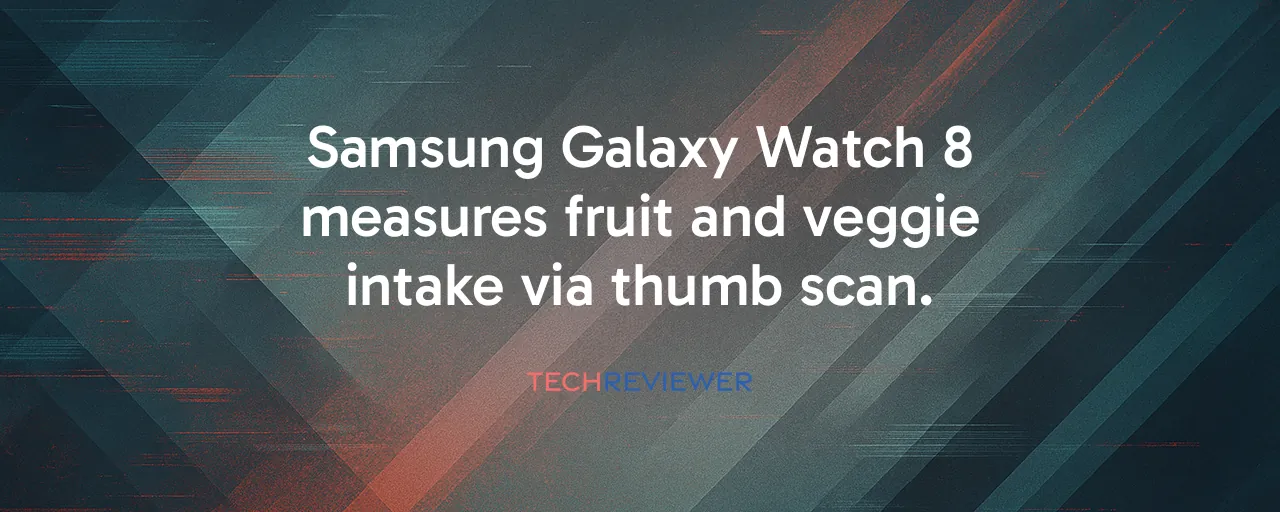A Peek Inside Your Diet
Ever wondered how many veggies you're actually eating? Samsung's Galaxy Watch 8, launched in July 2025, answers that question with a quick thumb scan. Its Antioxidant Index feature uses a tiny sensor to measure carotenoid levels in your skin, pigments from fruits and vegetables that reflect your dietary habits. In just five seconds, it translates those levels into a score, letting you know if you're hitting the World Health Organization's 400-gram daily target. No more guessing or logging every bite.
This approach feels like a breath of fresh air compared to clunky food-tracking apps. Those apps demand you manually enter every meal, which gets old fast, studies show over 80 percent of users abandon them. The Galaxy Watch 8, by contrast, works passively, picking up on plant pigments accumulated in your skin. It's a clever shortcut, born from years of research with Seoul National University, that delivers objective data without the hassle.
How It Works and Why It Matters
The tech behind this feature is surprisingly intricate for something so small. A coin-sized sensor in the watch's BioActive array uses multi-wavelength LEDs (blue, yellow, and ultraviolet light) to scan your fingertip. Custom photodetectors analyze the reflected light, and algorithms adjust for skin tone to ensure accuracy across diverse users. Unlike wrist-based sensors, fingertips have less melanin, which minimizes interference and makes readings reliable.
Why focus on carotenoids? These compounds, found in carrots, spinach, and tomatoes, are a direct marker of fruit and veggie intake since your body can't produce them. They also combat oxidative stress, a process linked to aging and chronic diseases like cancer. A 2025 study at Seoul National University showed skin carotenoid levels rise within one to two weeks of eating more produce, proving the watch can track dietary shifts in near real-time.
Real-World Impact: Two Studies That Prove It
To see how this tech plays out, consider two studies that shaped it. At Seoul National University, 80 participants ate meals with varying carotenoid content for six weeks. The Galaxy Watch 8's scans showed measurable increases in their skin carotenoid levels within days, aligning with their boosted veggie intake. This suggests the watch can motivate users by showing quick results, like when someone adds a daily salad and sees their score climb.
Meanwhile, validation studies tested the watch across diverse skin tones and backgrounds. The results matched traditional lab-based spectroscopy with high correlation, confirming the sensor's accuracy. For users, this means trustworthy feedback, whether you're a fitness buff aiming for peak health or a nutritionist counseling patients. These studies highlight a key strength: the watch delivers reliable, actionable insights without needing a lab.
Where Samsung Stands Out and Falls Short
Samsung's leap into nutrition tracking gives it an edge over competitors. Apple's Watch Series 11, released in September 2025, offers hypertension alerts and sleep scores but lacks any direct diet monitoring. Garmin and Fitbit haven't ventured into this space either, leaving Samsung to carve out a niche for wellness-focused consumers. Priced at $349.99, the Galaxy Watch 8 justifies its cost with unique features, though it's $50 pricier than its predecessor.
Still, the tech isn't perfect. It only measures carotenoids, so it won't tell you about protein or fat intake. Dirty fingers or inconsistent pressure during scans can skew results, and it takes one to two weeks for dietary changes to show up. Nutritionists might love the data, but some users might want more comprehensive tracking, like what AI-powered food-logging apps offer. Samsung Health's suggestions, like eating an extra tomato, help, but integration with broader food databases is limited.
What's Next for Wearable Nutrition
Samsung's innovation points to a bigger trend: wearables are moving beyond steps and heart rates to tackle complex health markers. The global smart wearables market is expected to hit $505.95 billion by 2035, driven by demand for tools like this. Nutritionists and healthcare providers see potential in using these devices for patient care, especially as chronic diseases rise. Imagine a doctor using your Antioxidant Index to tailor a diet plan, or employers integrating it into wellness programs.
Competitors will likely scramble to catch up. Apple's been working on non-invasive glucose monitoring for years, but it's still far off. Meanwhile, Samsung's partnership with Seoul National University sets a high bar for credibility and research. The catch? Users need clear education on what carotenoids mean and how to use the data. Privacy issues persist too. Health information attracts cybercriminals, as full records can sell for as much as $1,000 on underground markets. Samsung's challenge will be keeping trust while scaling this tech to more users.
